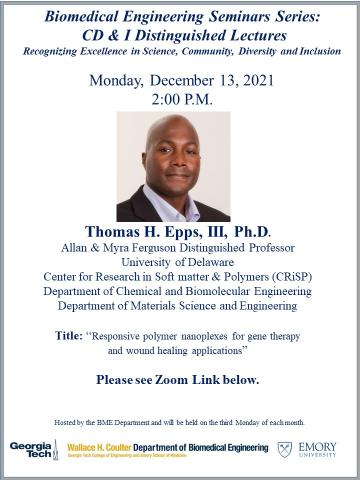event
Biomedical Engineering Seminars – CD&I Distinguished Lectures
Primary tabs
This event is offered virtually. Please click here to join via Zoom.
"Responsive polymer nanoplexes for gene therapy and wound healing applications"
Thomas H. Epps III, Ph.D.
Allan & Myra Ferguson Distinguished Professor of Chemical & Biomolecular Engineering
Director, Center for Research in Soft matter & Polymers (CRiSP), and Center for Hybrid, Active, & Responsive Materials (CHARM)
Joint Professor, Materials Science & Engineering,
Affiliated Professor, Biomedical Engineering
University of Delaware
ABSTRACT
Vascular bypass grafting is a routine treatment for cardiovascular diseases; however, nearly 50% of bypass grafts fail within a few years following surgery due to cellular inflammatory responses at the suture sites. To overcome this problem, we synthesized novel diblock polymers to deliver nucleic acid therapeutics capable of promoting healing in a spatiotemporal manner. A key component of our design is a monomer containing photocleavable o-nitrobenzyl moieties linking cationic groups to the polymer backbone so that light irradiation can induce polymer hydrolysis and charge reversal. The polymers self-assemble with anionic nucleic acids in solution to form nanoparticle complexes with a PEG “stealth” coating. Application of a photo-stimulus disrupts the electrostatic interactions to trigger the release of bound nucleic acids, such as siRNA, from the nanocomplexes. More significantly, our soft nanoparticles maintained stability in serum, exhibited robust cellular uptake, facilitated nanocarrier imaging, and were capable of photo-responsive on/off control over gene expression. These formulations enabled the knockdown of two key functional genes, IL1β and CDH11, that are implicated in inflammatory responses in human aortic adventitial fibroblasts. The complete knockdown of both genes, in combination, resulted in significant attenuation of TGF-β1-triggered fibroblast proliferation and differentiation into myofibroblasts, two of the primary hallmarks of fibrosis. Further attenuation over clinically relevant time scales was achieved by modulating the polyplex dosing regimen by taking input from a recently developed kinetic model, whose creation was enabled by our polymer design. Finally, we have very recently expanded our kinetic modeling to link in vitro experiments and in vivo delivery results.
BIOGRAPHY
Prof. Epps is the Director of the Center for Research in Soft matter & Polymers and the Thomas and Kipp Gutshall Professor of Chemical & Biomolecular Engineering at the University of Delaware (UD) with a joint appointment in Materials Science & Engineering and an affiliated appointment in Biomedical Engineering. He received his B.S. in Chemical Engineering from MIT in 1998 and an M.S. from Chemical Engineering from MIT in 1999. He received his Ph.D. in Chemical Engineering from the University of Minnesota in 2004. Prof. Epps was a National Research Council Postdoctoral Fellow at NIST from 2004-2006, prior to joining UD in the Fall of 2006.
His research interests include nanostructured soft materials from biobased feedstocks, nanotemplating of polymer films and coatings, polymeric materials for ion-conduction membranes (batteries and fuel cells), polymer/MOF composites, and nanostructured assemblies for targeted drug delivery and gene therapy. Prof. Epps has received several honors and awards including: the John H. Dillon Medal from APS (2016); the Owens-Corning Early Career Award from AIChE (2015); named a Kavli Fellow by the National Academy of Sciences (2014); the Sigma Xi Young Investigator Award (2014); the Martin Luther King, Jr. Visiting Professorship at MIT (2012); the Thomas & Kipp Gutshall Professorship at UD (2012); the UD Alison Society, Gerard J. Mangone Young Scholars Award (2011); the DuPont Young Professor Grant Award (2010); the Presidential Early Career Award for Scientists and Engineers (PECASE) (2009); the Air Force Young Investigator Award (2008); the National Organization for the Professional Advancement of Black Chemists and Chemical Engineers (NOBCChE) Lloyd N. Ferguson Young Scientist Award (2007), and a National Science Foundation (NSF) CAREER Award (2007) among others. Prof. Epps also is active in the American Chemical Society (ACS Board of Directors Development Advisory Board), American Institute of Chemical Engineers, American Physical Society (Polymers Division), and Sigma Xi. He was elected a Fellow of the American Physical Society in 2017 and a Fellow of the Royal Society of Chemistry (FRSC) in 2018. He is a member of the Department of Energy Basic Energy Sciences Advisory Committee (BESAC) and an associate editor for Science Advances.
Faculty Host: Dr. Maysam Nezafati
As part of the Coulter BME Seminar Series, these talks recognize excellence in science, community, diversity, and inclusion.
Groups
Status
- Workflow status: Published
- Created by: Joshua Stewart
- Created: 12/06/2021
- Modified By: Joshua Stewart
- Modified: 12/06/2021
Categories
Keywords
User Data
Target Audience

